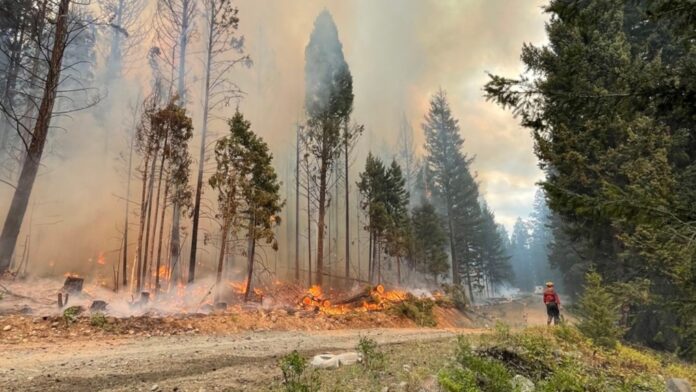
A combination of extreme drought conditions, gusting winds and incoming lightning storms could bring about the worst 24 to 48 hours of British Columbia’s 2023 wildfire season, officials warned Thursday.
Speaking at a news conference, Forestry Minister Bruce Ralston urged the public to monitor wildfire updates closely over the coming days, as recent record-breaking temperatures have worsened the already tinder-dry conditions across much of the province.
“This week we’ve seen a heat wave exacerbate serious drought conditions and wildfire risks here in British Columbia,” Ralston said. “There is a strong likelihood of new fire starts that will grow quickly and unpredictably.”
Environment and Climate Change Canada has issued special weather statements across much of the province, forecasting gusting winds of up to 70 km/h in some areas along with dry lightning – meaning lightning strikes accompanied by little to no rain.
Cliff Chapman of the B.C. Wildfire Service evoked the fresh devastation in Lahaina, Hawaii, as well as the ongoing emergency in Yellowknife while explaining just how quickly the flames may spread as the winds and lightning threaten to feed existing fires and spark “a significant number” of new ones.
“This weather event has the potential to be the most challenging 24 to 48 hours of the summer from a fire perspective,” he said.
“If ever there was a time to make sure you have an evacuation plan for you and your family, it’s now. If ever there was a time to make sure you have a grab-and-go bag, it is now.”
Chapman also addressed those who might be tempted to ignore evacuation orders, as some do every wildfire season, cautioning that “now is not the time” to take chances.
“The weather is going to be erratic and significant,” he said. “When there is an evacuation order, we urge you to please leave. We will try to get you home as soon as we can.”
Emergency Management and Climate Readiness Minister Bowinn Ma said temporary accommodations will be made available for evacuees, but asked residents living in high-risk areas to contact family or friends they might be able to stay with if forced to flee their homes.
“Make those arrangements now,” Ma said. “We are in peak tourism season and there is limited availability at hotels and motels.”
Approximately 480 people are already under evacuation orders in B.C., with another 4,900 on evacuation alert – 4,800 of whom were notified Wednesday night due to the out-of-control wildfire burning approximately 10 kilometres outside West Kelowna.
Officials said crews are preparing for the upcoming weather by securing fire guards, performing planned ignitions, and extinguishing active perimeters around existing wildfires.
There are approximately 3,400 people engaged in the province’s wildfire response, a decrease from recent weeks due to international crews from Australia, Brazil and Costa Rica heading home.
Chapman thanked those firefighters for their help, noting that some extended their stay by as long as one month to assist British Columbia.
There are still nearly 200 firefighters from Mexico involved in B.C.’s suppression efforts, and another 100 are expected over the next week, along with additional crews from central and eastern Canada.
